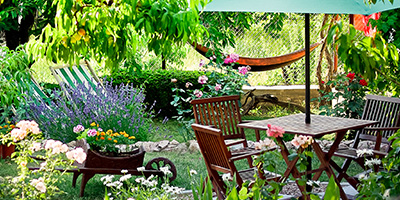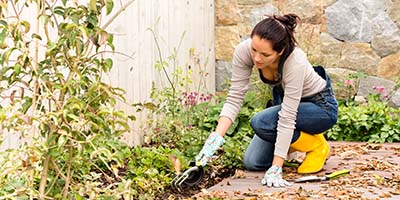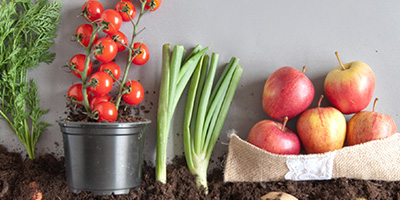5 Sustainable Gardening Ideas to Keep Your Garden Green

Sustainable Gardening Methods
Are you growing a garden this summer? Are you looking forward to spending time outside and harvesting veggies? What about improving your backyard sustainability? While it may seem like an eco-friendly hobby, gardening can actually do damage to the environment if you’re not careful. If going green is one of your gardening goals, take some time to read these sustainable gardening methods and work them into your plot.
What Is Sustainable Gardening?
Sustainable gardening methods are low impact ways to grow plants that aren’t harmful to the environment. This type of gardening uses resources thoughtfully and avoids using tactics that damage the environment.
Use the five green gardening ideas below to make your garden more eco-friendly.
5 Ways to Make Your Garden More Sustainable
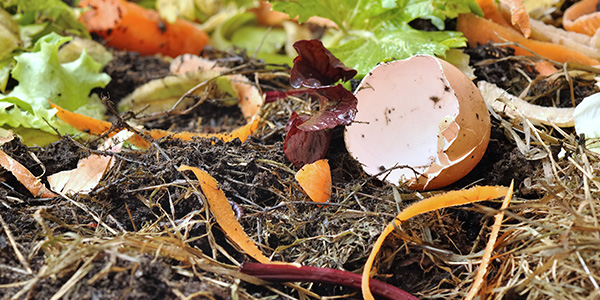
1. Compost Food Waste and Garden Waste
Composting, turning organic material into a rich soil conditioner, allows you to create your own natural plant fertilizer, which is great for sustainable gardening.
Composting improves backyard sustainability by:
- Reducing the need for synthetic fertilizers.
- Reducing the amount of garden waste that goes to the landfill.
- Improving the soil in your garden and getting rid of old dirt.
- Keeping in moisture and allowing you to conserve water.
Simply save all the organic matter from your kitchen, excluding meat scraps, and all the weeds and leaf cuttings from your garden. Place them in a composting bin (learn to make your own here) or compost pile. Once your compost has cured for a few weeks and looks dark and crumbly, add it to your garden. Compost will provide the minerals your plants need so you won’t have to add synthetic fertilizer or plant food.
2. Be Selective When Choosing Plants
Another sustainable gardening method is choosing plants that are native to your area and are adapted to the area’s climate.
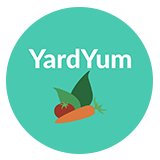
“Native plants are suited for your local soil and climate. They typically require less water, and the local birds and insects love them.”
Yard Yum | YardYum.com
In addition to choosing plants that are native to your environment, you can also select plants that are pest-resistant or drought-resistant. These plants require less attention, water and pesticides, conserving resources and energy. Selecting plants that are compatible with each other is a good idea for green gardening, too. Choosing companion plants can help you save water, deter insects and improve growth which will help your garden stay sustainable.
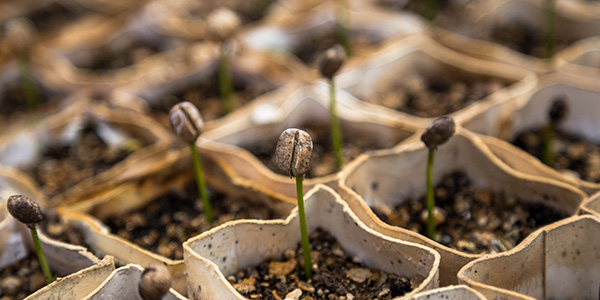
3. Use Recycled Materials as Gardening Supplies
Recycling is an important part of growing a sustainable garden because it helps keep items out of the landfill. Before your go out to buy mulch, weed barrier or anything else you may need for your garden, think about what you already have that could be recycled into what you need. (This green gardening tip can also save you a few dollars, too.)
Ways to recycle in your garden:
- Make mulch out of shredded newspaper or fallen leaves from around the yard.
- Place cardboard between rows to reduce weed growth.
- Use cardboard egg cartons or empty toilet paper rolls as containers for your indoor seedlings.
- Reuse plastic bottles into watering cans.
- Recycle backyard rocks to create a border around your garden.
4. Conserve and Recycle Water for Garden Sustainability
Water is a valuable resource and should be treated that way. That’s why one of the best ways to grow a garden sustainably is to only water plants when they need it and to recycle water that would otherwise go unused.
Unless the weather is hot and dry, you may only need to water two or three times a week. To further conserve water, use recycled water to irrigate your garden.
A rainwater collection system is a great way to conserve and recycle water in your garden. By collecting rainwater, you can save it until your garden needs a drink and then avoid turning on the faucet. If you don’t have room for this in your yard, there are plenty of other options that allow you to use this sustainable gardening method.
Additional ways to use recycled water in your garden:
- Place a bucket in your shower while it warms up and then use this to water your garden.
- Use water from unfinished water glasses and water bottles to water your plants.
- Install a grey water system.
Find more ways to conserve and recycle water here.

“Use mulch to slow down water evaporation. Add compost to soil. It helps to retain moisture. Don't use a sprinkler. It’s not an efficient way of watering; too much evaporates.”
Yard Yum | YardYum.com
5. Garden by Hand
You can reduce the environmental impact of your garden by taking care of it by hand, without the help of gas-powered machinery or chemicals. Using machines or chemicals in your garden releases harmful gasses into the air or the soil.
Instead of using a machine to till or cultivate your garden, use a shovel, rake and elbow grease to do the work. This sustainable gardening method won’t cost you anything but some time and maybe some sweat.
When it comes to weeding, plan to spend a couple hours in your garden every week rather than using a chemical weedkiller. Weeding by hand is better for the environment and means you won’t accidentally ingest chemicals when you harvest your veggies.

Pro Tip: Even if you don’t have a garden, you can use this gardening method to increase your backyard sustainability. You can use a manual push mower to cut your grass or avoid spraying your lawn with a weed killer.
Using just one of these sustainable gardening methods will make your garden more environmentally friendly. Decide which ones are right for you and get gardening. Have other sustainable gardening suggestions? Let us know in the comments.

